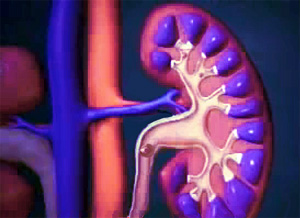How to cure glomerulonephritis
Glomerulonephritis is a kind of allergic infectious disease of the kidneys, mainly affecting glomerular apparatus. We are to distinguish primary glomerulonephritis that develops after 1 – 3 weeks after exposure to communicable and so called “non-infectious factors” being secondary glomerulonephritis occurred due to various diseases like systemic lupus erythematosus, etc. Acute glomerulonephritis is characterized by hypertension, edema and urinary syndrome which is the most common symptom and appears suddenly within 1 – 3 weeks after exposure to various factors.

In the development of glomerulonephritis the leading role belongs to the streptococcus infection. Nephrotoxic properties has a beta-hemolytic streptococcus of group A with its types 12, 4, 25, 49. However, for the realization of the pathogenic effect of streptococcus in the body requires certain conditions, as indicated by statistics upon the development of glomerulonephritis in a few cases so called nephrotoxic types of streptococcus. When strep glomerulonephritis is not found in the kidney tissue its etiologic role is to antigenic stimulation with subsequent formation of antibodies and circulating immune complexes that damage the kidney tissue. The emergence of acute glomerulonephritis may be influenced by viral infection, as evidenced by the discovery of its symptoms in the glomeruli of the kidneys in so called nefrobiopsia. Acute glomerulonephritis may develop after vaccination, when vaccine and serum act as antigens or destructive factors of immune responses in previously sensitized organism. Obviously, prior sensitization is important in the development of glomerulonephritis after being bitten by bees, snakes, etc. In a certain percentage of cases there is a direct relationship between the development of glomerulonephritis with cooling of the body under the action of which, obviously, change the properties of the protein with the acquisition of its antigenic characteristics (e.g. cryoglobulins) or activated latently current streptococcal infection.
Based on clinical and experimental research we distinguish 2 major immune mechanisms responsible for the development of acute glomerulonephritis which are:
- primary autoimmune with antibodies to the basal membrane of glomerular capillaries
- immunocomplex i.e. in primary autoimmune genesis of glomerulonephritis develop antibodies to glomerular basement membrane as a result of the acquisition of its antigenic characteristics with the subsequent formation of immune complexes in glomeruli and their damage.
In such a mechanism of the disease among people 10 – 15% of cases, the reaction of antigen are antibody binding which occurs with complement and with the participation of the blood coagulation system, histamine, serotonin and other factors. When the mechanism of immune deposit glomerulonephritis observed in 85 – 90% of cases, kidney damage occurs under the action of circulating soluble antigen with antibody complexes that are deposited in the glomerular capillaries. This antigen may be autologous or more with respect to exogenous origin (streptococcal, etc.).
Immune origin of streptococcal have glomerulonephritis, nephritis associated with serum sickness, caused by malaria and viral infection. In the transition of acute glomerulonephritis in a chronic form of autoimmune mechanisms to align. Clinical manifestations of acute glomerulonephritis usually appear within 7 – 21 days after infection. In other words after a certain latent period characterized by the formation and deposition of immune complexes in glomeruli. Most patients comprising 85 – 95% of cases experience the dynamics of clinical signs of acute glomerulonephritis characterized by cyclical and fit into 3 main periods:
- detailed clinical manifestations – the initial period;
- regression of symptoms;
- complete clinical and laboratory remission, while maintaining a more than 5 years can speak about healing the patient.
With non-cyclical or unfavorable course of acute glomerulonephritis may become chronic and fatal diseases of various complications that often occur in the first period.
Glomerulonephritis treatment
Radical treatment is impossible, as the process is autoimmune out of intensification, in most cases a nephroprotection is prescribed. Other preventive measures include: long bed rest, avoiding physical load and exposures to cold, working seated in dry warm room, diet, limit in salt to 2-3 grams per day, in protein, healthy food.
In severe cases glucocorticosteroids (dexamethasone, hydrocortisone), cytostatic agents (mercaptopurine, azatioprine, cyclophosphan), curantyl are taken. Sanatorium-and-spa treatment in dry hot climate is recommended.
In case of intensification a hospitalization is needed. Any worsening of urine test should be considered as intensification. The treatment is the same as for accute glomerulonephritis. However the treatment becomes much more difficult for patients with gastric ulcer, pancreatic diabetes, renal insufficiency, high hypertension or within first 15 weeks of pregnancy due to contra-indications.
Posted in Genitals and Urine